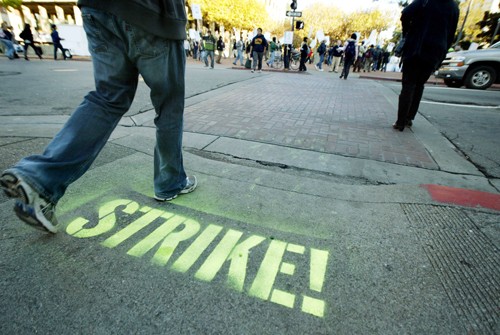Protests and police brutality occurred across several campuses after the University of California Board of Regents increased student fees 32 percent for all students last Thursday.
The University of California system is facing a budget shortfall of $1.2 billion dollars from the state, and officials hope the fee increases will generate $505 million, according to the University of California Web site.
The Regents met at the University of California, Los Angeles for two days. The second day they moved into a windowless room away from the public because of protesting interruptions the previous day. Police in full riot gear surrounded the building.
“”Well before the leaders passed it we had the three-day strike,”” said Katherine Cross, an environmental economy and policy sophomore at the University of California, Berkeley. “”There were a bunch of speakers every single day.””
The Associated Students of the University of California, San Diego organized a sleep-in, where students gathered at the school the night of Wednesday, Nov. 18 and were bused to UCLA the following day to “”be in the company of thousands of … fellow UC students (to) take a stand against the fee hikes!”” according to a Facebook advertisement for the event.
Once the fee increase was approved, campuses took action.
“”Wednesday, Thursday and Friday there were protests on campus, like they went into the library clamoring on the doors and windows,”” said Rima Kalush, a political science junior at the University of California, Davis. “”I didn’t go to class Thursday as part of the walk out; that was the extent of my participation.””
Even campuses that aren’t known for being politically active stood up and took part.
“”We’re not like Berkeley crazy,”” said Rohan Viswanathan, a student at UCSD. “”But it’s one of the few things that’s, like, jolted the campus.
“”There have been protests and walkouts. They tried to stage walkouts in a couple of my classes and a couple of my friends were involved in it. But I mean, I’m in it for the education.””
At Berkeley, a campus known for its political activism, a group of 40 people, the majority of them students, took over Wheeler Hall, where 118 classes were scheduled. They were protesting the laying off of 38 janitorial staff. About 3,800 students were unable to attend classes that day.
“”They locked all the doors and wouldn’t come out. And they brought like four days of food just in case they were there that long,”” Cross said. “”There were fully armed police pepper spraying kids, hitting them with batons outside of the building. It was police brutality and our administration is apologizing for it.””
In an e-mail sent to the entire Berkeley campus, Chancellor Robert J. Birgeneau said, “”We truly regret the incidents that brought physical and emotional injury to members of our community.””
He also stated that the University of California Police Department is conducting an operation review and called for all evidence “”including reports, videos and pictures taken by UCPD, students, the public and media, to ensure that actions were reasonable given the situation presented and the information known at the time.””
Birgeneau also informed members of the Berkeley community that he desired a separate review by students, faculty and staff of the Campus Police Review Board.
At UCLA, students took over Campbell Hall and chained the doors shut.
A rift has formed between the schools’ administration and the students.
“”They say they can’t afford to keep tuition at what it is, but they can afford to increase their paychecks?”” Kalush said. “”Like the new chancellor of Davis got her house paid for and she got spending money. Apparently there’s funds for that.””
Administrations are trying to get students to direct their anger towards the state with the movement called All. Together. Now. This movement is being pushed by UC for California, the university’s system-wide advocacy network that it “”is calling on all students, faculty, staff, alumni and friends to unite behind an aggressive push to make funding UC a state priority,”” said Linda P.B. Katehi, the chancellor for the UC Davis.
Not all students are in favor of the way the students have handled the protesting, which includes pulling fire alarms during classes throughout the day so buildings have to be evacuated, and then doing so again once classes are back and settled.
“”I’m not protesting because I still have to go to class, and I think I’m here to get an education,”” Cross said. “”I’m not interfering with their right to protest but they are interfering with my right to get an education.””









